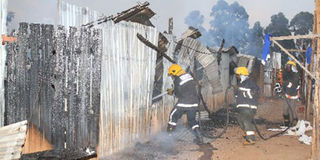Family, religious groups and media can help end student unrest

Firefighters from the Kisii county government try to extinguish a fire at Kerongorori Mixed Secondary School in Borabu on August 3, 2016. PHOTO | BENSON MOMANYI | NATION MEDIA GROUP
What you need to know:
While the media’s primary business is to inform the public, certainly they must exercise some higher national duty of responsibility and nationalism.
The media need to make a decision between selling a “good” story and preventing recurrence of strife in school through copycat strikes.
For its part, the TSC is staffing schools with qualified counsellors to attend to the students’ social, developmental and academic needs.
Lastly, every school has many old students of good moral and social standing. It’s time they went back to their old schools to mentor and inspire the current generation of learners.
The current spate of unrest in our schools is regrettable. Admittedly, school strikes have been sporadic over the years. However, research carried out on strikes in secondary school shows that they don’t occur in a vacuum. Their prevalence seems to increase proportionately with the happenings in the larger society.
As early as the 1970s, education researchers were grappling with the phenomenon of strikes in secondary schools. In 1974, there was concern when 60 out of the 1,030 secondary schools, then, went on strike in quick succession. This was a prevalence rate of about seven per cent compared to today’s one per cent of the more than 9,000 secondary schools.
Beyond these numbers, there emerges a tenacious correlation of the strikes of the 1970s with a period of robust expansion in the education, with the rise of community secondary schools, also known as harambee schools, with their challenges of staffing, funding and facilities.
Of course, the government has comprehensively addressed these issues through various interventions, including grants to schools and the Constituency Development Fund. However, as the Cabinet Secretary for Education, Dr Fred Matiang’i, says, more needs to be done.
In 1991, the context for strikes was the clamour for multiparty politics. The markedly high number of strikes in 2008 came in the aftermath of the 2007-2008 post-election violence. Therefore, there is a possibility that the occurrence of school strikes in times of general public anxiety, social and economic challenges is more than coincidental.
Whatever the context for the current strikes in the secondary schools, the attempt to apportion blame only distracts us from addressing the real issues and finding lasting and sustainable solutions.
BAD APPLES
While there are bound to be some bad apples in the basket, the attempts at near-wholesale condemnation of teachers is uncalled for.
By the very nature of their jobs, teachers are the candles that light our children’s minds. Beyond the classroom, our teachers impact on the lives of our youth in a big way, driven by passion, compassion and selflessness.
Teachers are not only parental substitutes, but also selfless mentors and role models to our children. They teach our children how to be tolerant, genuine with themselves and sensitive to other people’s conditions. To do all these, our teachers connect with their charges and reach them on multiple levels and are able to affect virtually every aspect of our children’s lives. American psychiatrist Karl Menninger famously said: “What the teacher is, is more important than what he teaches”.
As we interrogate the happenings in our schools, we must relook at the institutions through which our children are socialised. These include the family unit, religious institutions and the media. Of these, the family takes a major prominence in shaping our children’s characters because the initial learning is from their parents and their immediate environment.
But we have to live with the reality that our families have fundamentally changed over the last 25 years and some of them are now led by single parents, many of whom are busy and are effectively missing in their children’s lives. This gap may lead to alcohol and drug abuse, resulting in strife in schools.
The importance of sound grounding of our children’s upbringing on religious principles cannot be overemphasised. It forms the basis of a just nation.
While the media’s primary business is to inform the public, certainly they must exercise some higher national duty of responsibility and nationalism. The media need to make a decision between selling a “good” story and preventing recurrence of strife in school through copycat strikes.
For its part, the TSC is staffing schools with qualified counsellors to attend to the students’ social, developmental and academic needs.
Lastly, every school has many old students of good moral and social standing. It’s time they went back to their old schools to mentor and inspire the current generation of learners.
Nancy Macharia is the chief executive officer of the Teachers Service Commission; [email protected].




